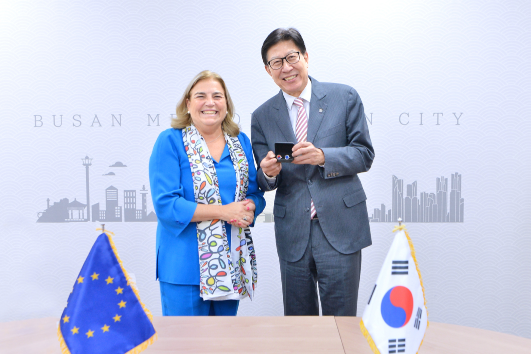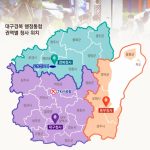Busan, South Korea— In a meeting on October 23, 2024, Busan Mayor Park Heong-joon and EU Ambassador Maria Castillo Fernandez reaffirmed their commitment to tackling climate change and plastic pollution. Their discussion focused on the mutual goal of achieving carbon neutrality by 2050 and the importance of enhancing collaboration between Busan and the European Union (EU). They also explored how Busan’s initiatives align with upcoming global environmental regulations, including the EU’s Carbon Border Adjustment Mechanism (CBAM), which will come into force in 2026.
During the meeting, Mayor Park emphasized Busan’s leadership in sustainable urban development through its Green Smart City strategy, which promotes environmental and economic innovation. He highlighted several key local projects, including the RFID-based food waste reduction system and plans for integrated resource recycling facilities, underscoring Busan’s efforts to promote a circular economy.
Ambassador Fernandez expressed admiration for Busan’s proactive stance, particularly its goal to reduce greenhouse gas emissions by 45% by 2030. She discussed how the EU’s Green Deal and climate policies align with Busan’s initiatives and pointed to several areas of potential cooperation, such as recycling, waste management, and marine industry innovations.
The conversation also addressed the CBAM, a significant policy that will affect businesses exporting to the EU. Mayor Park voiced concern over the impact of this mechanism on small and medium-sized enterprises (SMEs) in Busan, many of which depend on exports to European markets. He urged for stronger cooperation and information exchange between Busan and the EU to help these businesses transition to the new regulations smoothly.
A key part of the meeting focused on the upcoming 5th Intergovernmental Negotiating Committee (INC-5) session on plastic pollution, which will take place from November 25 to December 1, 2024, in Busan. This global conference is crucial for finalizing an international treaty on plastic pollution, a major step in addressing the entire plastic lifecycle—from production to waste management.
Mayor Park shared updates on Busan’s preparations for hosting the event, which will feature a range of activities, including forums, exhibitions, and displays of plastic-related artwork by local artists. The event is expected to draw international attention, further positioning Busan as a global hub for environmental initiatives.
The INC-5 conference is a critical milestone in the development of a legally binding global plastics treaty, set to be completed by 2025. As global negotiators converge on Busan, the focus will be on reducing plastic waste and curbing the production of primary plastic polymers (PPP), a major source of environmental harm.
Ambassador Fernandez noted the importance of cities like Busan in implementing global climate and environmental policies. She reiterated the EU’s desire to deepen collaboration with Busan across various sustainability sectors, especially in light of the upcoming challenges posed by both the CBAM and the plastics treaty.
The conversation concluded with a focus on the long-term benefits of EU-Busan cooperation, both economically and environmentally. Mayor Park expressed optimism that continued dialogue and partnership with the EU would help mitigate the effects of new environmental regulations on local businesses, while also advancing Busan’s leadership in sustainable urban development.
As both sides work to achieve carbon neutrality by 2050 and lead efforts in global plastic pollution reduction, their collaboration sets a strong example for future city-level and international partnerships.



